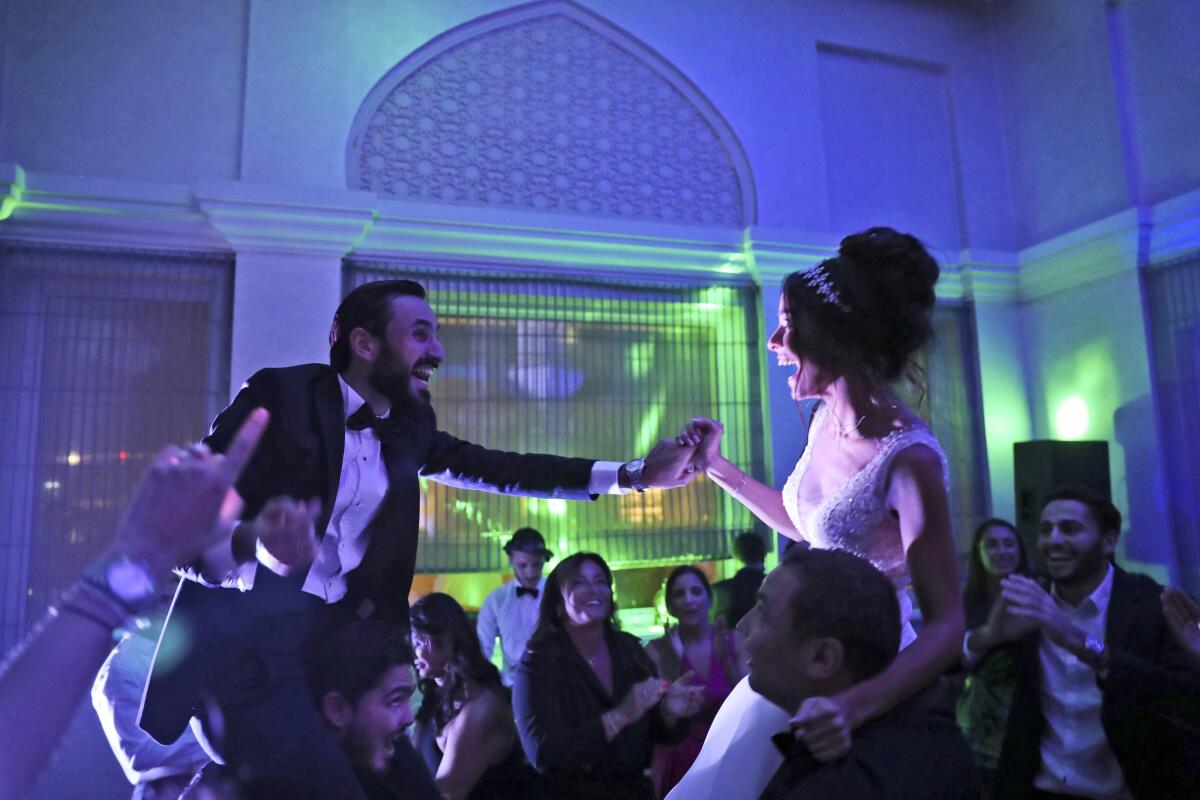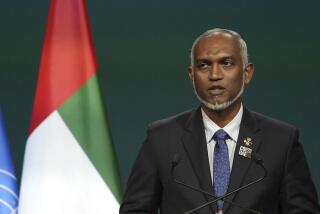In new playground Dubai, Israelis find parties, Jewish rites

DUBAI, United Arab Emirates — It was a scene that just a few months ago would have been unthinkable. As Emiratis in flowing white robes and headdresses looked on, the Israeli bride and groom were hoisted on the shoulders of skullcap-wearing groomsmen and carried toward the dance floor, where dozens joined the throng swaying and singing in Hebrew.
Noemie Azerad and Simon David Benhamou didn’t just throw a somewhat normal wedding bash in the middle of a pandemic that has shut down their country and ravaged the world. They were reveling in Dubai in the United Arab Emirates, which, like most of the Arab world, had been off-limits to Israeli passport holders for decades.
The pair was among tens of thousands of Israelis who had flocked to the UAE in December after the two countries normalized ties in a breakthrough U.S.-brokered deal.
Israel’s latest virus-induced lockdown, which began earlier this week, temporarily cooled the travel fever. But Israelis with dashed vacation plans, now stuck at home, hope that vaccination campaigns will help contain the outbreak and make Dubai trips possible again soon.
‘My mom died last night.’ A teacher lost to COVID-19, leaving a young son and so many others reeling
For an L.A. Times reporter covering the pandemic, the statistics suddenly became tragic, personal losses, family and friends taken by the virus.
The lure of Dubai, the UAE’s skyscraper-studded commercial hub with sandy beaches and marbled malls, has already proved powerful. Scores of Israeli tourists, seeking revelry and relief from months-long virus restrictions and undeterred by their government’s warnings about possible Iranian attacks in the region, have celebrated weddings, bar mitzvahs and the eight-day Jewish festival of Hanukkah with large gatherings banned back home.
“I expected to feel really uncomfortable here,” said 25-year-old Azerad, the Israeli bride, from the hotel ballroom, bathed in the glow of Dubai’s glittering skyline. But all of her preferred wedding destinations announced tough restrictions on gatherings to check the spread of the virus. Dubai caps parties at 200.
Unwilling to delay the wedding, the choice was obvious.
“I feel like it’s Tel Aviv,” Azerad said of Dubai. “I hear Hebrew everywhere.”
Her French father, Igal Azerad, said he always hides his skullcap in his pocket for fear of assault on the streets of Paris. But in Dubai the sight of his kippah prompts “Emiratis to come up and tell me ‘Shalom,’” he said.
The dizzying pace of normalization has stunned even the skeptics. Despite the countries’ long-secret ties, the UAE had considered Israel a political pariah over the decades-old Israeli-Palestinian conflict. The modest expat Jewish community in the federation of seven sheikhdoms kept a low profile and prayed in an unmarked villa.
But the arrival of 70,000 Israeli tourists, according to travel agents’ estimates, on 15 nonstop daily flights in December changed everything. A 12-foot Hanukkah candelabra appeared under the Burj Khalifa, the world’s tallest tower, where Jews gathered to light the candles and take selfies as festive Hebrew songs blared across the massive fountain downtown.
The Jewish community’s furtive Friday night Shabbat meal has transformed into celebrations at two cavernous banquet halls with spillover seating for Israeli visitors. “Made in Israel” signs have popped up in Dubai’s chain grocery and liquor stores, which now sell wine from the Israeli-annexed Golan Heights. Wine, honey and tahini from Israeli settlements in the occupied West Bank will hit the shelves in the coming weeks and be labeled products of Israel, according to a Dubai-based commodities company.
On social media, a trip to the UAE has become a status symbol for Israelis who display photos of themselves in Dubai. A dozen hotels across the city say they’ve booked thousands of Israeli travelers and hosted a range of Israeli business conferences, holiday parties and days-long weddings. Israeli singers have planned concerts for spring. Kosher catering companies from the United Kingdom and elsewhere have set up shop in the UAE. Plans are underway to break ground on the country’s first Jewish cemetery and ritual bath known as a mikvah, according to Rabbi Mendel Duchman, who helps run the country’s Jewish Community Center.
“It was unbelievable, it was a tsunami,” said Mark Feldman, head of Jerusalem-based Ziontours, noting the contrast to Israel’s “cold peace” with Egypt and Jordan. “Dubai became an oasis for Israelis in the middle of the pandemic.”
For weeks in December, the only other countries where Israelis could land without a 14-day home quarantine upon return were Rwanda and the Seychelles. Dubai has remained open for business and tourism, with few restrictions beyond social-distancing indoors and masks outside. Guests at weddings and other gatherings often do not wear masks.
Even as Israelis gush about the warm embrace of their hosts, very little has been heard about the UAE’s 180-degree shift from its 1 million citizens, who are granted free housing, education and health care and tend to seclude themselves from their country’s vast expatriate population. The sheikhdom’s hereditary rulers suppress dissent. Even dramatic political decisions are met with acquiescence.
Ahmed al-Mansoori, an Emirati museum director who has welcomed dozens of Israeli visitors to his collection of ancient maps and manuscripts, including a fourth-century Torah scroll, acknowledged “some cultural misunderstandings among populations that haven’t really dealt with each other before.”
“Each Emirati has their own psychology about this,” he said when asked about the policy reversal that Palestinians view as a betrayal of their quest for a state on lands occupied by Israel.
But he noted that Dubai, a city powered by millions of workers from Africa, Asia and the Middle East, easily absorbs waves of expats, including from countries locked in bitter struggles with each other.
Despite initial worries about Iranian threats and diplomatic fallout from misbehaving tourists, travel agents say there have been only minor hiccups. A few Israeli tourists got stuck in sand dunes while racing on quad bikes, prompting an elaborate rescue mission by a government helicopter, said Yaniv Stainberg, owner of Privilege Tourism. Some were arrested for snapping photos at a mosque, he added. Others were scolded for kissing in public, an offense punishable under the UAE’s Islamic legal system with prison time.
But as the virus surged in Israel and photos of raucous unmasked parties in Dubai splashed across social media, Israel’s health and foreign ministries were reportedly sparring over whether to classify the UAE as a high-infection zone, which would require quarantine upon arrival in Israel and perhaps mar the countries’ new courtship.
Within days, the point was moot. Israel entered its third lockdown on Sunday. By then, the newlyweds, Azerad and Benhamou, had returned home.
“COVID has really hindered us. It’s unfortunate for all the new friends in the region who we want to meet,” said Eliav Benjamin, an Israeli Foreign Ministry official, referring to Israel’s other recent normalization agreements with Bahrain, Sudan and Morocco. “Vaccines, however, will be a game-changer.”
More to Read
Sign up for Essential California
The most important California stories and recommendations in your inbox every morning.
You may occasionally receive promotional content from the Los Angeles Times.









